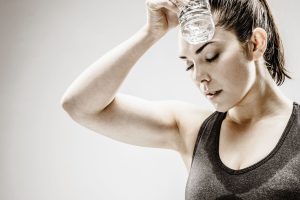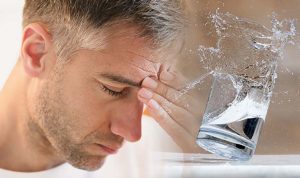- 28 February 2024
- 317
Dry Spell: Explaining How Dehydration Can Bring on Headaches

Introduction
Dehydration is a common condition that occurs when your body loses more fluids than it takes in. While it may seem harmless, dehydration can lead to a range of health issues, including headaches. In this comprehensive guide, we’ll delve into the relationship between dehydration and headaches, exploring the mechanisms behind this phenomenon and offering practical tips to prevent and alleviate dehydration-induced headaches. Need to Explore More About Health Problems And Their Solutions (Pee Urgency When To Get Home)
Understanding Dehydration
Dehydration occurs when the body loses more fluids than it takes in. This can happen due to various factors, including excessive sweating, inadequate fluid intake, vomiting, diarrhea, or certain medical conditions such as diabetes or kidney disease. When the body lacks sufficient fluids, it disrupts essential functions, leading to a cascade of adverse effects.

The Role of Water in the Body
Water is vital for the body’s proper functioning. It serves as a medium for various biochemical reactions, helps regulate body temperature, lubricates joints, aids digestion, and facilitates nutrient transport. Approximately 60% of the human body is composed of water, emphasizing its critical importance for overall health and well-being.
Symptoms of Dehydration
Recognizing the signs of dehydration is crucial for prompt intervention. Common symptoms include:
- Thirst
- Dry mouth
- Dark urine
- Fatigue
- Dizziness
- Headache
Dehydration and Headaches
One of the hallmark symptoms of dehydration is headaches. When the body loses fluids, it can lead to a decrease in blood volume and a subsequent drop in blood pressure. In response, the brain’s blood vessels may constrict in an attempt to maintain adequate blood flow and oxygen delivery. This constriction can trigger tension headaches or migraines, characterized by throbbing pain, sensitivity to light and sound, and nausea.

The Mechanism Behind Dehydration-Induced Headaches
Reduced Blood Flow to the Brain
Dehydration can impair blood circulation, reducing the delivery of oxygen and nutrients to the brain. As a result, brain cells may become deprived of essential resources, leading to dysfunction and the onset of headaches.
Electrolyte Imbalance
Electrolytes, such as sodium, potassium, and chloride, play a crucial role in maintaining proper fluid balance within the body. When dehydration occurs, electrolyte levels can become imbalanced, disrupting nerve function and contributing to headache development.
Increased Histamine Production
Dehydration may stimulate the production of histamine, a compound involved in immune responses and inflammation. Elevated histamine levels can trigger vasodilation, causing blood vessels to widen and potentially exacerbating headache symptoms.
Preventing Dehydration-Induced Headaches
Stay Hydrated
The most effective way to prevent dehydration-induced headaches is to stay properly hydrated. Aim to drink an adequate amount of water throughout the day, especially during hot weather or physical activity. Individual fluid needs may vary based on factors such as age, gender, weight, and activity level.
Monitor Fluid Intake
Pay attention to your fluid intake and make a conscious effort to drink water regularly. Keep a reusable water bottle with you as a reminder to hydrate, and consume fluids with meals and snacks to maintain hydration levels.
Replace Electrolytes
In addition to water, replenish electrolytes lost through sweat by consuming electrolyte-rich beverages or foods. Sports drinks, coconut water, and fruits such as bananas and oranges are excellent sources of electrolytes.
Avoid Dehydrating Substances
Limit your intake of dehydrating substances such as caffeine and alcohol, as they can increase urine production and contribute to fluid loss. If consuming these beverages, balance them with adequate water intake to prevent dehydration.
Alleviating Dehydration-Induced Headaches
Rehydrate Promptly
If you experience a headache due to dehydration, rehydrate promptly by drinking water or electrolyte-rich fluids. Sipping slowly and steadily can help alleviate symptoms and restore hydration levels.
Rest and Relaxation
Find a quiet, comfortable environment to rest and relax while rehydrating. Practice deep breathing exercises, gentle stretching, or meditation to relieve tension and promote relaxation.

Use Cold Compresses
Applying a cold compress or ice pack to the forehead or neck can help constrict blood vessels and alleviate headache pain. Alternatively, taking a cool shower or bath may provide similar relief.
| Preventive Measures | Description |
|---|---|
| Stay Hydrated | Ensure adequate water intake throughout the day, especially during hot weather or physical activity. |
| Monitor Fluid Intake | Keep track of your fluid intake and drink water regularly. |
| Replace Electrolytes | Replenish electrolytes lost through sweat with sports drinks, coconut water, or electrolyte-rich foods. |
| Avoid Dehydrating Substances | Limit consumption of caffeine and alcohol, balancing them with adequate water intake. |
| Rehydrate Promptly | Drink water or electrolyte-rich fluids at the onset of dehydration symptoms. |
| Rest and Relaxation | Find a quiet, comfortable environment to relax while rehydrating, practicing relaxation techniques such as deep breathing or meditation. |
| Use Cold Compresses | Apply cold compresses or ice packs to constrict blood vessels and alleviate headache pain. Alternatively, take a cool shower or bath for relief. |
Conclusion
Dehydration is a common yet often overlooked cause of headaches. By understanding the relationship between dehydration and headaches and adopting preventive measures, such as staying hydrated, monitoring fluid intake, and replenishing electrolytes, individuals can effectively mitigate the risk of dehydration-induced headaches. Remember to listen to your body’s signals and prioritize hydration to maintain optimal health and well-being.

